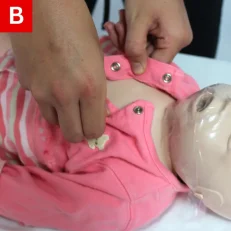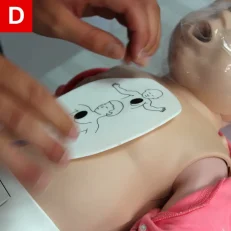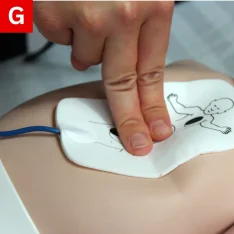Introduction to PALS
The Resuscitation Team
PALS Basic Life Support
Pediatric Advanced Life Support
Resuscitation Tools
Respiratory Distress/Failure
Tachycardia
Cardiac Arrest
Pediatric Post-Resuscitation Care
PALS Essentials
PALS Skills Training
Practice Megacodes Before Your Exam (Optional)
PALS Exam
AED Infants & Children
If you look around the public places you visit, you are likely to find an Automated External Defibrillator (AED). An AED is both sophisticated and easy to use, providing life-saving power in a user-friendly device. This makes the device useful for people who have no experience operating an AED and allows successful use in stressful scenarios. However, proper use of an AED is very important. The purpose of defibrillation is to reset the electrical systems of the heart, allowing a normal rhythm a chance to return.
Criteria for AED Use:
No response after shaking and shouting.
Not breathing or ineffective breathing.
No carotid artery pulse detected.
AED STEPS FOR CHILDREN AND INFANTS
- Retrieve the AED (Figure 10a).
- Open the case.
- Turn on the AED.
- Expose the infant or the child’s chest (Figure 10b).
- If wet, dry chest.
- Remove medication patches.
- Open the pediatric AED pads (Figure 10c). If pediatric pads are not available, use adult pads. Ensure that the pads do not touch.
- Peel off backing.
- Check for pacemaker or defibrillator; if present, do not apply patches over the device.




- Apply the pads (Figure 10d).
- Upper right chest above the breast.
- Lower left chest below the armpit.
- If pads will touch on the chest of an infant, apply one pad on the anterior chest and another pad on the posterior of the infant instead.
If the AED is not working properly, continue giving CPR. Do not waste excessive time troubleshooting the AED. CPR always comes first; AEDs are supplemental.
Do not use AED in water.



Figure 10
AED STEPS FOR CHILDREN AND INFANTS CONTINUED
- Ensure wires are attached to AED box (Figure 10e).
- Move away from the person (Figure 10f).
- Stop CPR.
- Instruct others not to touch the person.
- AED analyzes the rhythm.
- If message reads “Check Electrodes,” then:
- Ensure electrodes make good contact.
- If message reads “Shock,” then shock.
- Resume CPR for two minutes (Figure 10g).
- Repeat cycle.


